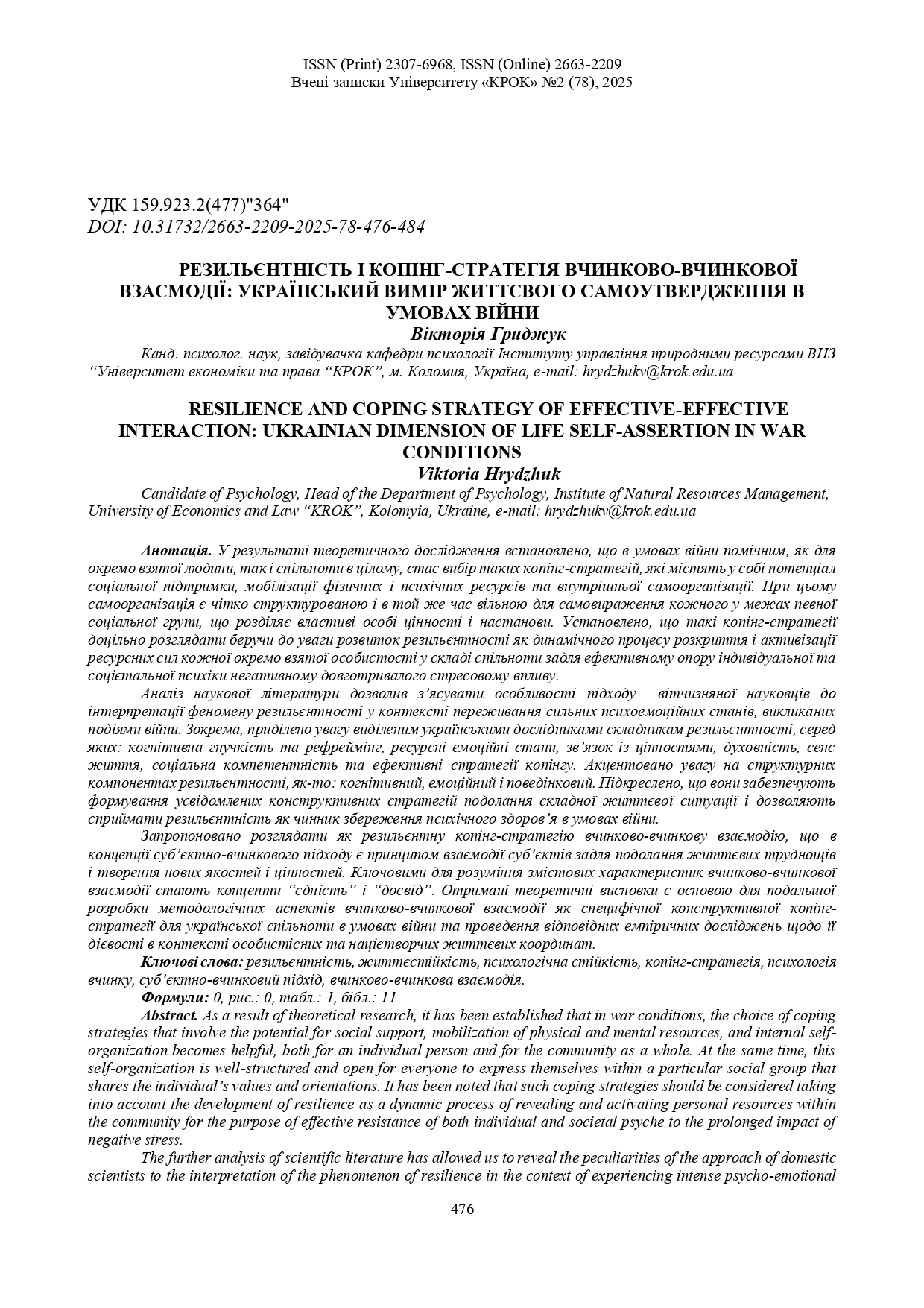RESILIENCE AND COPING STRATEGY OF EFFECTIVE-EFFECTIVE INTERACTION: UKRAINIAN DIMENSION OF LIFE SELF-ASSERTION IN WAR CONDITIONS
DOI:
https://doi.org/10.31732/2663-2209-2025-78-476-484Keywords:
resilience, hardiness, psychological stability, coping strategy, psychology of action, subject-action approach, action-to-action interactionAbstract
As a result of theoretical research, it has been established that in war conditions, the choice of coping strategies that involve the potential for social support, mobilization of physical and mental resources, and internal self-organization becomes helpful, both for an individual person and for the community as a whole. At the same time, this self-organization is well-structured and open for everyone to express themselves within a particular social group that shares the individual’s values and orientations. It has been noted that such coping strategies should be considered taking into account the development of resilience as a dynamic process of revealing and activating personal resources within the community for the purpose of effective resistance of both individual and societal psyche to the prolonged impact of negative stress.
The further analysis of scientific literature has allowed us to reveal the peculiarities of the approach of domestic scientists to the interpretation of the phenomenon of resilience in the context of experiencing intense psycho-emotional states caused by the events of the war. Particular attention has been paid to the components of resilience identified by Ukrainian researchers, including cognitive flexibility and reframing, resourceful emotional states, value orientation, spirituality, life meaning, social competence and effective coping strategies. Special emphasis is placed on the structural components of resilience, such as: cognitive, emotional and behavioral. It should be stressed that they ensure the formation of conscious constructive strategies for overcoming a difficult life situation and allow us to perceive resilience as a key factor in maintaining mental health during wartime.
The action-to-action interaction is proposed as a resilient coping strategy, which in the concept of the subject-action approach serves as a the principle of interaction between subjects to overcome life difficulties and create new qualities and values. The key concepts for understanding the content characteristics of action-to-action interaction are “unity” and “experience”. The theoretical conclusions drawn provide a foundation for further development of methodological aspects of action-to-action interaction as a specific constructive coping strategy for the Ukrainian community in wartime conditions and conducting relevant empirical research on its effectiveness in the context of personal and nation-building life coordinates.
Downloads
References
Афузова, Г., Найдьонова, Г., & Кротенко, В. (2023). Резильєнтність як чинник збереження психічного здоров’я в умовах воєнного стану. Габітус, 53, 100–104. Retrieved from: http://habitus.od.ua.
Медянова, О., Дворніченко, Л., Любіна, Л., Кононенко, О. & Шкраб’юк, В. (2023). Психологічна резильєнтність особистості в умовах війни. Перспективи та інновації науки. Серія “Педагогіка”, Серія “Психологія”, Серія “Медицина”, 10(28), 601-611. doi: https://doi.org/10.52058/2786-4952-2023-10(28)-601-611.
Поліщук, О., & Потапчук, Є. (2023). Резильєнтність – потенціал відновлення особистості у складних життєвих обставинах. Психологічний журнал, 11, 45-52. Retrieved from: http://psyj.udpu.edu.ua/issue/view/17731.
Саутвік, С., & Чарні, Д. (2022). Резилієнтність: мистецтво долати найбільші виклики життя. Львів: Галицька видавнича спілка.
Сингаївська, І., & Страмоусова, І. (2024). Чинники життєстійкості жінок під час війни. Вчені записки Університету «КРОК», 3(75), 231-245.
DOI: https://doi.org/10.31732/2663-2209-2024-75-231-245
Татенко, В. (2021). Соціальна психологія націєтворення: суб’єктно-вчинковий підхід: монографія. Національна академія педагогічних наук України, Інститут соціальної та політичної психології. Кропивницький: Імекс-ЛТД.
Чиханцова, О. (2017). Модель життєстійкості особистості. Актуальні проблеми психології. V.17, 142-150. Retrieved from: http://appsychology.org.ua.
Charney, D. & Nemeroff, C. (2004). The Peace of Mind Prescription: An Authoritative Guide to Finding the Most Effective Treatment for Anxiety and Depression. Houghton Mifflin Harcourt. 259.
Cherry, K. (2023, May 03). How Resilience Helps You Cope With Life's Challenges. Retrieved from: https://www.verywellmind.com/what-is-resilience-2795059.
Hellerstein, D. (2011). How I can become resilient. Heal Your Brain. Retrieved from: https://www.psychologytoday.com/us/blog/heal-your-brain/201108/how-can-i-become-more-resilient
Ungar, M. (2008). Resilience across cultures. The British Journal of Social Work, 38(2). 218-235.

Downloads
Published
How to Cite
Issue
Section
License

This work is licensed under a Creative Commons Attribution-NonCommercial 4.0 International License.

